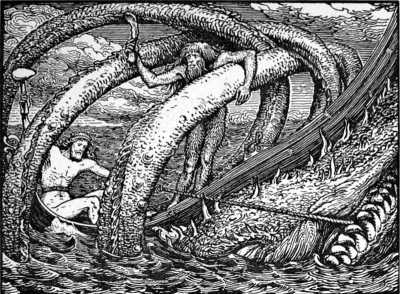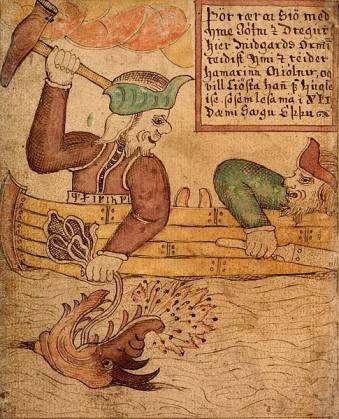Hymiskvida is thought to have been a late addition to the collection of poems known as the Poetic Edda. It was likely written in the first half of the 11th century. It tells the story of when Thor and Tyr went to see Tyr’s father, the jötun Hymir, about a kettle. The story also brings Thor face to face with Jormungand, the Midgard serpent and prophesied killer of Thor.
On the surface, the story is fairly straightforward. The gods want Aegir to brew mead for them so that they can feast at his hall. Not necessarily wanting to be the gods designated host for all eternity, Aegir tries to find a way off the hook.
Claiming he doesn’t have a kettle large enough to brew all the mead required, he says he is unable to. Faced with this challenge, Tyr remembers his father, the jötun Hymir, had several enormous kettles in his great hall.
This is the setup for Thor and Tyr’s adventure into Jotunheim where Thor comes close to killing Jormungand. In the end, he does kill scores of jotnar, Tyr’s father among them.
While the story isn’t that creative and the poem doesn’t hold any vast insights into the broader mythology, I still find it interesting. There is great animosity between Tyr and his father, while Tyr’s mother willingly helps them in their quest of outwitting Hymir.
What the reason behind this dynamic is seems unclear, or maybe it was known to the Vikings of the time.
Is Hymir really Tyr’s father?
While Tyr himself names Hymir as his father, there is no love lost between them. Hymir in particular seems less than enthusiastic to hear his wayward son has returned home to visit. In Skaldskaparmal, Snorri states that Odin is Tyr’s father and this might be an explanation.
Odin is well known for his philandering, even bragging about it to Thor in the poem Harbardsljöd. Could it be that Hymir is more of an adopted father of Tyr, and Odin the true father, after some dubious tryst with Tyr’s mother?
This is in truth just a pet theory of my own making but would explain the strained relationship between Tyr and Hymir. It would also explain why Tyr, who would otherwise be hundred percent jötun, is accepted as a major Aesir god.
A surprising number of the Aesir and Vanir gods are actually half jötun themselves. As well as there are those who take jötun mates, like Freyr, but no god is more than half jötun. Tyr’s mysterious parentage makes for a more interesting story and might reflect Viking society at the time as well.
In the warrior culture and honor-driven society of the Norsemen, I think there would be a great number of fatherless children. In such a place, having foster parents, with the tensions that might bring, was likely a common issue.
Having those dynamics reflected in their mythology makes sense and might help legitimize it to some degree. With the caveat that I am not well enough to read up on this topic, it is fascinating to dive into how myths mirrored their everyday life.
Similarities with other poems
Hymiskvida doesn’t offer much in the way of facts or insight into Norse mythology, it is more of an entertaining story. As such it is similar to Thrymskvida and Skirnismol who both are thin on facts and insights, more plain storytelling. This is in contrast to poems like Vafthruthnirsmal, Grimnismal and Völuspá for example which all are rich in facts.
There are some recurring themes in the story that are staples throughout the old Norse myths. Hospitality is always strong in the myths, even when Hymir receives the jötun killer Thor, he is welcome to stay.
Through a battle of wits and strength, Thor outmaneuvers Hymir and is given the kettle. This right of the strongest was a major part of Viking society as well. When challenged, a vikingr was expected to accept and possibly fight to the death.
In this story, as is often the case, Thor slays a whole host of jotnar and the gods are victorious.
This translation is based upon an old translation by Henry Adams Bellows, but I have both updated the English and tried to adapt it anywhere I felt the text strayed from the original.
The Lay of Hymir
1. In the old days, the gods held feasts together,
And they sought drink before they were satisfied;
They shook twigs and tasted blood:
They found rich food in Ægir’s hall.
2. The mountain dweller sat happily like a boy,
But soon he looked like a blind man;
The son of Ygg looked into his eyes:
“You will soon provide a feast for the gods.”
3. The word-wielder worked for the giant,
And sought revenge on the gods;
He ordered Sif’s husband to bring the kettle:
“In it, I will brew much ale for all of you.”
4. The famous ones could not find it,
And the holy gods could not find it anywhere;
Until, in a truthful manner, Tyr spoke out,
And gave helpful advice to Hlorrithi.
5. “There lives to the east of Elivagar,
Hymir the wise at the end of heaven;
My father has a fierce kettle,
A mighty vessel a mile deep.”
Thor spoke:
“Do you think we can win this whirler of water?”
Tyr spoke:
“Yes, my friend, if we are cunning.”
7. That day they traveled quickly,
From Asgarth they came to Egil’s home;
He guarded the goats with horned heads;
Then they went to the hall where Hymir lived.
8. The youth found his grandmother, whom he greatly loathed,
And she had nine hundred heads;
But the other, fair with gold, came out,
And the bright-browed one brought beer to her son.
9. “Giant’s kinsman, beneath the kettle,
I will set you both, you brave heroes;
For many times my beloved wife
Is angry and fierce to guests.”
10.Late at night, the misshapen Hymir,
The harsh giant, returned from hunting;
The icicles rattled as he came in,
For the giant’s chin was frozen.
11. “Greetings, Hymir! May you have good thoughts;
Your son has come to your hall now;
(We have been waiting for him, his journey was long);
And with him comes the enemy of Hroth,
The friend of mankind, they call him Veur.
12. “See where they sit under the gable!
They hide behind the beam.”
At the giant’s glance, the beam broke,
And the mighty pillar fell to pieces.
13. Eight fell from the ledge, and only one,
The hard-hammered kettle, was whole;
Then they came out and the giant sought his foes,
The old giant, and looked at them with his eyes.
14. His heart foretold much sorrow when he saw
The enemy of the giantess come out on the floor;
Then they brought in three oxen,
And the giant ordered them to be boiled.
15. Each one was shortened by a head,
And they took the beasts straight to the fire;
The husband of Sif, before he went to sleep,
Ate two of Hymir’s oxen alone.
16. To the old companion of Hrungnir,
Hlorrithi’s meal seemed very powerful;
“Next time at evening we three must eat
The food we have as the hunting’s spoil.”
17. Veur wanted to row on the sea, he said,
if the brave giant would give him bait.
Hymir spoke:
18. “Go to the herd, if you have it in mind,
You slayer of giants, to seek your bait;
For there you can soon find, I think,
Bait from the oxen easy to get.”
19. The hero quickly went to the wood,
Until he found an all black ox before him;
From the beast, the slayer of giants broke
The high fortress of its double horns.
Hymir spoke:
20. “I think your actions are far worse,
You steerer of ships, than when you’re still sitting.”
21. The lord of the goats ordered the ape-begotten
To steer the steed of the rollers further;
But the giant said that his will, truly,
To row longer was little enough.
22. The mighty Hymir soon pulled up two whales
On a single cast;
In the stern, the kinsman of Othin sat,
And Veur prepared his cast with cunning.
23. The warder of men, the destroyer of worms,
Fixed the head of the ox on his hook;
The foe of the gods gaped at the bait,
The girdler of all the earth beneath.

24. The venomous serpent quickly up
To the boat did Thor, the bold one, pull;
With his hammer, the loathly hill of hair
Of the brother of Fenrir he struck from above.
25. The monsters roared and the rocks resounded,
And all the earth so old was shaken;
Then the fish sank in the sea forthwith.
26. Joyless as they rowed back was the giant;
Speechless did Hymir sit at the oars,
With the rudder he sought a second wind.
Hymir spoke:
27. “Will you have half of our toil with me,
And now make fast our goat of the flood;
Or will you bear home the whales to the house,
Across the gorge of the wooded glen?”
28. Hlorrithi stood and gripped the stem,
And lifted the sea-horse with water awash;
Oars and bailer and all he bore
With the surf-swine home to the giant’s house.
29. The giant wanted to match his might again,
For he was stubborn with the strength of Thor;
None truly strong, though he rowed stoutly,
Would he call, save one who could break the cup.
30. Hlorrithi then, when he held the cup,
Struck the pillars of stone with the glass;
As he sat, he shattered the posts in pieces,
Yet the glass was brought whole to Hymir.
31. But the fair loved one of the giant found
A true counsel and told her thought:
“Smash the skull of Hymir, heavy with food,
For it is harder than ever was glass.”
32. The goats’ mighty ruler then rose on his knee,
And struck with all the strength of a god;
The fellow’s helmet-stem was whole,
But the wine-cup was shattered and rounded.
Hymir spoke:
33. “Fair is the treasure that is gone from me,
Since now the cup lies shattered on my knees;”
So spoke the giant: “I can say no more
In the days to come, ‘You are cursed, my ale.’
34. “It will be enough if you can bring out
From our house the kettle here.”
Tyr then twice tried to move it,
But the kettle twice stood fast before him.
35. The father of Modi seized the rim firmly,
And before it stood on the floor below;
On his head, Sif’s husband raised it,
And the handles clattered around his heels.
36. They had not gone far when the son of Odin looked back
Once more to see;
From their caves in the east he saw them coming
With Hymir, the throng of the many-headed.
37. He stood and cast the kettle from his back,
And wielded Mjollnir, the lover of murder;
So he killed all the whales of the waste.
38. They had not gone far when one of Hlorrithi’s goats lay
Half-dead on the ground;
The pole-horse was lame in its leg;
The evil deed was done by Loki.
39. But you have all heard, for those who have
The tales of the gods, who can tell them better?
What prize he won from the wilderness-dweller,
Who gave him both his children as well.
40. The mighty one came to the council of gods,
And he had the kettle that was Hymir’s;
So the gods could gladly drink their ale
In Ægir’s hall at the autumn-time.
Featured Image Credit: Lorenz Frølich, Public domain, via Wikimedia Commons


